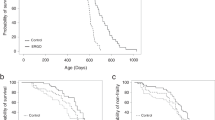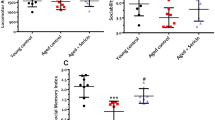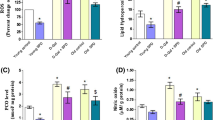Abstract
Let alone calorie restriction, life span extension in higher organisms has proven to be difficult to achieve using simple drugs. Previous studies have shown that the polyamine spermidine increased the maximum life span in C. elegans and the median life span in mice. However, younger subjects (< 40 years of age) are infrequently prescribed nor self-medicating with antiaging drugs. Therefore, in the present study, we aimed at assessing the effect of long-term treatment with spermidine given in the drinking water on behavioral performance and longevity of male, middle-aged Sprague-Dawley rats. We report that spermidine given in the drinking water did not extend neither the median nor the maximum life span of the middle-aged male Sprague-Dawley rats. However, spermidine treatment had a beneficial effect on the body weight and the kidney tubules, liver, and heart morphology. Behaviorally, spermidine led to a reduction in anxiety and an increase in curiosity, as assessed by exploratory behavior. Moreover, long-term treatment with spermidine enhanced autophagy in the brain and led to a diminished expression of the inflammatory markers, Tgfb, CD11b, Fcgr1, Stat1, CR3, and GFAP mRNAs in several cortical region and hippocampus of the treated rats suggesting that one beneficial effect of the long-term treatment with spermidine is an attenuated proinflammatory state in the aged brain. Our results suggest that long-term treatment with spermidine increases health span of middle-aged rats by attenuating neuroinflammation and improving anxiety and exploratory behavior.




Similar content being viewed by others
References
Abolaji AO, Adedara AO, Adie MA, Vicente-Crespo M, Farombi EO. Resveratrol prolongs lifespan and improves 1-methyl-4-phenyl-1,2,3,6-tetrahydropyridine-induced oxidative damage and behavioural deficits in Drosophila melanogaster. Biochem Biophys Res Commun. 2018;503:1042–8. https://doi.org/10.1016/j.bbrc.2018.06.114.
Al-Regaiey KA. The effects of calorie restriction on aging: a brief review. Eur Rev Med Pharmacol Sci. 2016;20:2468–73.
Anderson S, Brenner BM. Effects of aging on the renal glomerulus. Am J Med. 1986;80:435–42.
Anisimov VN, Zabezhinski MA, Popovich IG, Piskunova TS, Semenchenko AV, Tyndyk ML, et al. Rapamycin extends maximal lifespan in cancer-prone mice. Am J Pathol. 2010;176:2092–7. https://doi.org/10.2353/ajpath.2010.091050.
Balage M, Averous J, Rémond D, Bos C, Pujos-Guillot E, Papet I, et al. Presence of low-grade inflammation impaired postprandial stimulation of muscle protein synthesis in old rats. J Nutr Biochem. 2010;21:325–31. https://doi.org/10.1016/j.jnutbio.2009.01.005.
Bolton WK, Sturgill BC. Spontaneous glomerular sclerosis in aging Sprague-Dawley rats. II. Ultrastructural studies. Am J Pathol. 1980;98:339–56.
Buchhold B, Mogoanta L, Suofu Y, Hamm A, Walker L, Popa-Wagner A. Environmental enrichment improves functional and neuropathological indices following stroke in young and aged rats. Restor Neurol Neurosci. 2007;25:1–18.
Catterson JH, Khericha M, Dyson MC, Vincent AJ, Callard R, Haveron SM, et al. Short-term, intermittent fasting induces long-lasting gut health and TOR-independent lifespan extension. Curr Biol. 2018;28:1714–1724.e4. https://doi.org/10.1016/j.cub.2018.04.015.
Cheng XT, Xie YX, Zhou B, Huang N, Farfel-Becker T, Sheng ZH. Characterization of LAMP1-labeled nondegradative lysosomal and endocytic compartments in neurons. J Cell Biol. 2018;217:3127–39. https://doi.org/10.1083/jcb.201711083.
Collins JJ, Evason K, Pickett CL, Schneider DL, Kornfeld K. The anticonvulsant ethosuximide disrupts sensory function to extend C. elegans lifespan. PLoS Genet. 2008;4:e1000230. https://doi.org/10.1371/journal.pgen.1000230.
Danilov A, Shaposhnikov M, Shevchenko O, Zemskaya N, Zhavoronkov A, Moskalev A. Influence of non-steroidal anti-inflammatory drugs on Drosophila melanogaster longevity. Oncotarget. 2015;6:19428–44. https://doi.org/10.18632/oncotarget.5118.
Denic A, Glassock RJ, Rule AD. Structural and functional changes with the aging kidney. Adv Chronic Kidney Dis. 2016;23:19–28. https://doi.org/10.1053/j.ackd.2015.08.004.
Douris N, Melman T, Pecherer JM, Pissios P, Flier JS, Cantley LC, et al. Adaptive changes in amino acid metabolism permit normal longevity in mice consuming a low-carbohydrate ketogenic diet. Biochim Biophys Acta. 2015;1852:2056–65. https://doi.org/10.1016/j.bbadis.2015.07.009.
Eisenberg T, Knauer H, Schauer A, Büttner S, Ruckenstuhl C, Carmona-Gutierrez D, et al. Induction of autophagy by spermidine promotes longevity. Nat Cell Biol. 2009;11:1305–14. https://doi.org/10.1038/ncb1975.
Eisenberg T, Abdellatif M, Schroeder S, Primessnig U, Stekovic S, Pendl T, et al. Cardioprotection and lifespan extension by the natural polyamine spermidine. Nat Med. 2016;22:1428–38. https://doi.org/10.1038/nm.4222.
Fujita T, Fukase M, Baba H, Yamaguchi T, Takata S, Fujimi T, et al. New actions of parathyroid hormone through its degradation. J Endocrinol Investig. 1992;15:121–7.
Guerra GP, Rubin MA, Mello CF. Modulation of learning and memory by natural polyamines. Pharmacol Res. 2016;112:99–118. https://doi.org/10.1016/j.phrs.2016.03.023.
Gupta VK, Scheunemann L, Eisenberg T, Mertel S, Bhukel A, Koemans TS, et al. Restoring polyamines protects from age-induced memory impairment in an autophagy-dependent manner. Nat Neurosci. 2013;16:1453–60. https://doi.org/10.1038/nn.3512.
Gupta VK, Pech U, Bhukel A, Fulterer A, Ender A, Mauermann SF, et al. Spermidine suppresses age-associated memory impairment by preventing adverse increase of presynaptic active zone size and release. PLoS Biol. 2016;14(9):e1002563. https://doi.org/10.1371/journal.pbio.1002563.
Harrison DE, Strong R, Sharp ZD, Nelson JF, Astle CM, Flurkey K, et al. Rapamycin fed late in life extends lifespan in genetically heterogeneous mice. Nature. 2009;460:392–5. https://doi.org/10.1038/nature08221.
Hussain SS, Ali M, Ahmad M, Siddique KHM. Polyamines: natural and engineered abiotic and biotic stress tolerance in plants. Biotechnol Adv. 2011;29:300–11. https://doi.org/10.1016/j.biotechadv.2011.01.003.
Jia K, Chen D, Riddle DL. The TOR pathway interacts with the insulin signaling pathway to regulate C. elegans larval development, metabolism and life span. Development. 2004;131:3897–906. https://doi.org/10.1242/dev.01255.
Kapahi P, Zid BM, Harper T, Koslover D, Sapin V, Benzer S. Regulation of lifespan in Drosophila by modulation of genes in the TOR signaling pathway. Curr Biol. 2004;14:885–90. https://doi.org/10.1016/j.cub.2004.03.059.
Kiechl S, Pechlaner R, Willeit P, Notdurfter M, Paulweber B, Willeit K, et al. Higher spermidine intake is linked to lower mortality: a prospective population-based study. Am J Clin Nutr. 2018;108:371–80. https://doi.org/10.1093/ajcn/nqy102.
Konopka AR, Laurin JL, Musci RV, Wolff CA, Reid JJ, Biela LM, et al. Influence of Nrf2 activators on subcellular skeletal muscle protein and DNA synthesis rates after 6 weeks of milk protein feeding in older adults. Geroscience. 2017;39:175–86. https://doi.org/10.1007/s11357-017-9968-8.
Kumar S, Dietrich N, Kornfeld K. Angiotensin converting enzyme (ACE) inhibitor extends Caenorhabditis elegans life span. PLoS Genet. 2016;12:e1005866. https://doi.org/10.1371/journal.pgen.1005866.
Lashmanova E, Proshkina E, Zhikrivetskaya S, Shevchenko O, Marusich E, Leonov S, et al. Fucoxanthin increases lifespan of Drosophila melanogaster and Caenorhabditis elegans. Pharmacol Res. 2015;100:228–41. https://doi.org/10.1016/j.phrs.2015.08.009.
Lewis KN, Rubinstein ND, Buffenstein R. A window into extreme longevity; the circulating metabolomic signature of the naked mole-rat, a mammal that shows negligible senescence. Geroscience. 2018;40:105–21. https://doi.org/10.1007/s11357-018-0014-2.
Livak KJ, Schmittgen TD. Analysis of relative gene expression data using real-time quantitative PCR and the 2(−Delta Delta C(T)) method. Methods. 2001;25:402–8. https://doi.org/10.1006/meth.2001.1262.
López-Otín C, Galluzzi L, Freije JMP, Madeo F, Kroemer G. Metabolic control of longevity. Cell. 2016;166:802–21. https://doi.org/10.1016/j.cell.2016.07.031.
Madeo F, Zimmermann A, Maiuri MC, Kroemer G. Essential role for autophagy in life span extension. J Clin Invest. 2015;125:85–93. https://doi.org/10.1172/JCI73946.
Madeo F, Eisenberg T, Pietrocola F, Kroemer G. Spermidine in health and disease. Science. 2018;359(6374):eaan2788. https://doi.org/10.1126/science.aan2788.
Matsumoto M, Kurihara S, Kibe R, Ashida H, Benno Y. Longevity in mice is promoted by probiotic-induced suppression of colonic senescence dependent on Upregulation of gut bacterial polyamine production. PLoS One. 2011;6:e23652. https://doi.org/10.1371/journal.pone.0023652.
Miller RA, Harrison DE, Astle CM, Baur JA, Boyd AR, de CR FE, et al. Rapamycin, but not resveratrol or simvastatin, extends life span of genetically heterogeneous mice. J Gerontol A Biol Sci Med Sci. 2011;66:191–201. https://doi.org/10.1093/gerona/glq178.
Niraula P, Ghimire S, Lee H, Kim MS. Ilex paraguariensis extends lifespan and increases an ability to resist environmental stresses in Drosophila. Rejuvenation Res. 2018;21. https://doi.org/10.1089/rej.2017.2023.
Nishimura K, Shiina R, Kashiwagi K, Iagarashi K. Decrease in polyamines with aging and their ingestion from food and drink. J Biochem. 2006;139:81–90. https://doi.org/10.1093/jb/mvj003.
Ogrodnik M, Miwa S, Tchkonia T, Tiniakos D, Wilson CL, Lahat A, et al. Cellular senescence drives age-dependent hepatic steatosis. Nat Commun. 2017;8:15691. https://doi.org/10.1038/ncomms15691.
Patterson SL. Immune dysregulation and cognitive vulnerability in the aging brain: interactions of microglia, IL-1β, BDNF and synaptic plasticity. Neuropharmacology. 2015;96:11–8. https://doi.org/10.1016/j.neuropharm.2014.12.020.
Rais M, Wilson RM, Urbanski HF, Messaoudi I. Androgen supplementation improves some but not all aspects of immune senescence in aged male macaques. Geroscience. 2017;39:373–84. https://doi.org/10.1007/s11357-017-9979-5.
Rieu I, Magne H, Savary-Auzeloux I, Averous J, Bos C, Peyron MA, et al. Reduction of low grade inflammation restores blunting of postprandial muscle anabolism and limits sarcopenia in old rats. J Physiol. 2009;587:5483–92. https://doi.org/10.1113/jphysiol.2009.178319.
Roberts MN, Wallace MA, Tomilov AA, Zhou Z, Marcotte GR, Tran D, et al. A Ketogenic diet extends longevity and healthspan in adult mice. Cell Metab. 2017;26:539–546.e5. https://doi.org/10.1016/j.cmet.2017.08.005.
Rubinsztein DC, Mariño G, Kroemer G. Autophagy and aging. Cell. 2011;146:682–95. https://doi.org/10.1016/j.cell.2011.07.030.
Sandu RE, Buga AM, Uzoni A, Petcu EB, Popa-Wagner A. Neuroinflammation and comorbidities are frequently ignored factors in CNS pathology. Neural Regeneration Research. 2015;10:1349–55. https://doi.org/10.4103/1673-5374.165208.
Sato T, Wu X, Shimogaito N, Takino J, Yamagishi S, Takeuchi M. Effects of high-AGE beverage on RAGE and VEGF expressions in the liver and kidneys. Eur J Nutr. 2009;48:6–11. https://doi.org/10.1007/s00394-008-0753-4.
Shobin E, Bowley MP, Estrada LI, Heyworth NC, Orczykowski ME, Eldridge SA, et al. Microglia activation and phagocytosis: relationship with aging and cognitive impairment in the rhesus monkey. Geroscience. 2017;39:199–220. https://doi.org/10.1007/s11357-017-9965-y.
Soda K, Kano Y, Nakamura T, Kasono K, Kawakami M, Konishi F. Spermine, a natural polyamine, suppresses LFA-1 expression on human lymphocyte. J Immunol. 2005;175:237–45. https://doi.org/10.4049/jimmunol.175.1.237.
Soda K, Dobashi Y, Kano Y, Tsujinaka S, Konishi F. Polyamine-rich food decreases age-associated pathology and mortality in aged mice. Exp Gerontol. 2009;44:727–32. https://doi.org/10.1016/j.exger.2009.08.013.
Tottori K, Nakai M, Uwahodo Y, Miwa T, Yamada S, Oshiro Y, Kikuchi T, Altar CA. Attenuation of scopolamineinduced and age-associated memory impairments by the sigma and 5-hydroxytryptamine(1A) receptor agonist OPC-14523 (1-10.1007/s11357-019-00152-5 [3-[4-(3-chlorophenyl)-1-piperazinyl]propyl]-5-methoxy-3,4-dihydro-2[1H]-quino linone monomethanesulfonate). J Pharmacol Exp Ther. 2002;301(1):249–257.
Vellai T, Takacs-Vellai K, Zhang Y, Kovacs AL, Orosz L, Muller F. Genetics: influence of TOR kinase on lifespan in C. elegans. Nature. 2003;426:620. https://doi.org/10.1038/426620a.
Wang QJ, Ding Y, Kohtz DS, Mizushima N, Cristea IM, Rout MP, et al. Induction of autophagy in axonal dystrophy and degeneration. J Neurosci. 2006;26:8057–868. https://doi.org/10.1523/JNEUROSCI.2261-06.2006.
Wilkinson JE, Burmeister L, Brooks SV, Chan CC, Friedline S, Harrison DE, et al. Rapamycin slows aging in mice. Aging Cell. 2012;11(4):675–82. https://doi.org/10.1111/j.1474-9726.2012.00832.x.
Wirth M, Benson G, Schwarz C, Köbe T, Grittner U, Schmitz D, et al. The effect of spermidine on memory performance in older adults at risk for dementia: a randomized controlled trial. Cortex. 2018;109:181–8. https://doi.org/10.1016/j.cortex.2018.09.014.
Zhang M, Caragine T, Wang H, Cohen PS, Botchkina G, Soda K, et al. Spermine inhibits proinflammatory cytokine synthesis in human mononuclear cells: a counterregulatory mechanism that restrains the immune response. J Exp Med. 1997;185:1759–68. https://doi.org/10.1084/jem.185.10.1759.
Zhu F, Li Y, Zhang J, Piao C, Liu T, Li HH, et al. Senescent cardiac fibroblast is critical for cardiac fibrosis after myocardial infarction. PLoS One. 2013;8:e74535. https://doi.org/10.1371/journal.pone.0074535.
Funding
This work was supported by the EU Framework Programme for Research and Innovation, Horizont 2020, project number 667302 to APW, and UEFISCDI, project numbers PN-III-P4-ID-PCE-2016-0340 to DH, PN-III-P2-2.1-PED-2016-1013, and PN-III-P4-ID-PCE-2016-0215 to APW.
Author information
Authors and Affiliations
Contributions
MF, IU, and AO performed the experiments. CM assessed the pathology; EP and DMH contributed to the design of the experiments and to the writing of the manuscript. APW designed the experiments and wrote the manuscript.
Corresponding author
Ethics declarations
Conflict of interest
The authors declare that they have no conflict of interest.
Additional information
Publisher’s note
Springer Nature remains neutral with regard to jurisdictional claims in published maps and institutional affiliations.
About this article
Cite this article
Filfan, M., Olaru, A., Udristoiu, I. et al. Long-term treatment with spermidine increases health span of middle-aged Sprague-Dawley male rats. GeroScience 42, 937–949 (2020). https://doi.org/10.1007/s11357-020-00173-5
Received:
Accepted:
Published:
Issue Date:
DOI: https://doi.org/10.1007/s11357-020-00173-5




